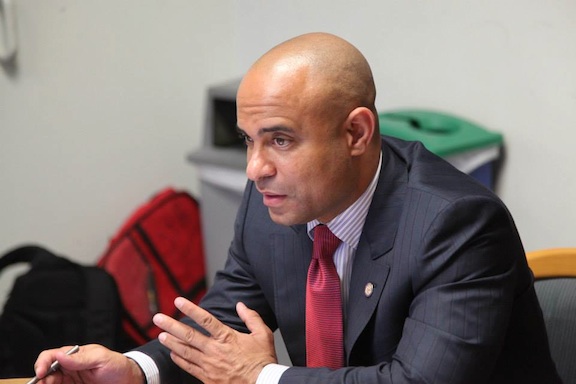By Daniella Bien-Aime
Op-Ed Contributor
WHEN MOST people think of Haiti, innovation does not come to mind. Yet the country is ripe for innovation because of the need to rebuild every industry.
Apple is a leader in innovation. It is common knowledge that Apple was on the brink of collapse, but, rescued by Steve Jobs, it bounced back to become a respected leader in the world of business and innovation.
Haiti has often been defined as a country near collapse, as the poorest country in the Western Hemisphere and a “basket case.”
The first two can be argued to be true, but the latter is unfair.
After all, how can a country so rich in natural resources, and with one of the top three largest populations in the Caribbean be referred to as a basket case? Haiti has more potential than some of the established economies in the region.
That’s why Haiti needs to look to Apple for inspiration on how to rise from the ashes of collapse, and restore its name as “The Pearl of the Caribbean.”
Haitian business leaders and educators can learn from Steve Jobs’ style of effective leadership and the creative space he nurtured at Apple.
Haiti must be seen as an organization that needs to be turned around. Thus, whenever a stakeholder thinks about any project to develop Haiti, innovation must be at its core.
Three aspects must be considered: (1) turning the Haitian people’s creativity into profitability, (2) teaching entrepreneurship in Haiti, and (3) developing network innovation.
Turning Existing Creativity into Profitability
The media often reminds anyone willing to listen that most people in Haiti live on $2 per day. There might be some truth to that statistic, but we must process it in a meaningful way.
For instance, unless someone has actually lived on $2 a day, had family members living on that wage, or worked with that population and observed their survival skills on a day-to-day basis, then, the story can be misleading.
Indeed, it takes an incredible amount of creativity to make $2 feed a family. For example, family members tend to pool their money or resources to start a roadside “Fritai” food business, among other small businesses.
Haiti is known for that type of economic creativity, which is the basis of its informal economy.
“Most of the economic activity in Haiti is informal – it is not regulated and it is not included in the national statistics,” Andres Marroquin (2012) wrote in his article “Entrepreneurship and Economic Development in Jeremie, Haiti.
Accordingly, Haitians interested in the progress and development of Haiti should focus on bringing the people in the informal economy into the formal economy where they can become part of the business process, and where they can grow. This is the fear of some of the country’s elite, but it must be done.
Teaching Entrepreneurship
One of the ways that the international community keeps Haiti dependent and poor is through “aid giving.”
The Haitian diaspora can change how Haiti is rebuilt by changing the way that Haitian émigrés financially support their friends and families back home.
For example, instead of sending 100 percent of the money home to take care of the family monthly, why not take a small percentage of that amount to help a family start a business?
According to Marroquin (2012), “Entrepreneurship is the main driver of economic growth. Innovation and creativity are its main features.”
“Economic historians like TS Ashton (1964) and Joel Mokyr (2004) have examined the transformation from poverty to riches during and after the industrial revolution, and emphasize the causal effect of invention on economic growth,” Marroquin wrote.
For that reason, it is in the best interest of Haiti to build more startups, cultivate leaders, and focus on teaching entrepreneurship.
(Photo: Depositphotos@ivelin)
Network Innovation
Steve Jobs’ strategy of using network innovation to make Apple a leader must be considered for Haiti.
“Apple is, in short, an orchestrator and integrator of technologies, unafraid to bring ideas from outside but always adding its own twists,” The Economist wrote in 2007. Equally, Haitian business leaders should innovate like Apple did in order to influence Haiti’s economic development by, as the Economist wrote, “Making network innovation work involves cultivating contacts with startups and academic researchers, constantly scouting for new ideas.”
By scouting ideas, innovation will emerge. This was the outcome of scouting new ideas from Duquesne Fernard from D&E Green Enterprises, a Haitian company that produces ecological cooking stoves that was awarded the 2013 Small Island Developing States Award in Great Britain.
Haiti’s case for innovation has already been established, not only because the country needs to be built from the bottom-up, but also innovation has historically proven to be central to economic growth.
The challenge for Haitian leaders will be to work on collaborating with one another in order to drive the change they wish to see in Haiti.
Daniella Bien-Aime is an adult learning and leadership development professional, teacher and trainer. She is a graduate of Teachers College, Columbia University, with a Master’s in Adult Learning and Leadership and a contributing writer for Haiti Business Week. Follow her on Twitter @dbienaime.
Note: the opinions expressed in Caribbean Journal Op-Eds are those of the author and do not necessarily reflect the views of the Caribbean Journal.
Haiti Prime Minister Laurent Lamothe Makes Visit to Venezuela


